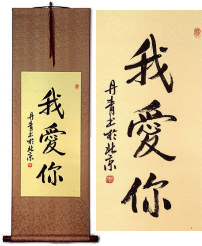

#I love you in chinese pdf#
This blog post is available as a convenient and portable PDF that youĬlick here to get a copy. Celebrate all the Chinese romantic holidays Show love with gifts rather than with words Let’s dive in deeper and look at some different ways to share romantic feelings in Mandarin! They’re charming nicknames Chinese people give their loved ones to show… The more you learn Chinese, the more you’ll come across these Chinese terms of endearment. Implicit: Unlike the globally recognized Valentine’s Day, which is for established couples, the 520 Internet Valentine’s Day is preferred by men and women to subtly express their love using digital codes.32+ Common Chinese Terms of Endearment You Need to Know | FluentU Chinese Blog.Spiritual: Gifts exchanged on May 20 and 21 lean more towards the “spiritual.” It could be a coded message of love sent over the internet or mobile phone.
#I love you in chinese free#

The difference between 520 and 521 is that the former is largely a day for women, while the latter caters to men. May 20 is particularly crucial as men utilize this opportunity to express their romantic love for women, often presenting gifts or ‘hongbao.’ Some couples even choose this date for their wedding ceremony.

While they lack historical roots, they are products of commercial promotions in the 21st century.ĭespite not being official holidays, the evenings of these days see restaurants and cinemas bustling and prices surging due to Valentine’s Day celebrations.

These two dates, May 20 & 21, serve as annual internet Valentine’s Days in China, echoing the phrases “I (5) love (2) you (0/1)” in Chinese. The “520 Day” traces its roots to Taiwanese singer Fan Xiaolan’s song “Digital Love,” where “520” symbolized “I love you.” Over time, “521” was also interpreted as “I am willing,” and “I love you” in China, earning various epithets like “Marriage Day,” “Love Expression Day,” and “Love Festival.” The campaign featured brand spokesperson Cai Xukun and garnered 180 million views as of May 5. Prada’s 520 campaign page on Weiboįor instance, luxury brand Prada, created a campaign using the hashtag #prada520# on Weibo, one of China’s top social platforms. Nonetheless, businesses capitalized on the festival by initiating online engagement campaigns. These days are regarded as Chinese versions of Valentine’s Day, with the 520-day holding special significance as it symbolizes “I Love You.”ĭespite not being an official holiday, 520 Day has garnered popularity among couples and singles as an opportunity to express romantic love.ĭue to the ongoing pandemic in 2020, the “520 Day” celebration witnessed changes with fewer public gatherings. While February 14 remains the globally recognized Valentine’s Day, the Chinese honor their affection on several other occasions as well, including May 20 (520 Day) and the Qixi Festival. The number “520” phonetically resembles “Wo Ai Ni” or “I Love You” in Chinese. What’s this “520 day” that intrigues many in China? The term 520, an abbreviation for May 20, denotes an unofficial Valentine’s Day in China. #520# a trending topic on Weibo around 20 May in China


 0 kommentar(er)
0 kommentar(er)
